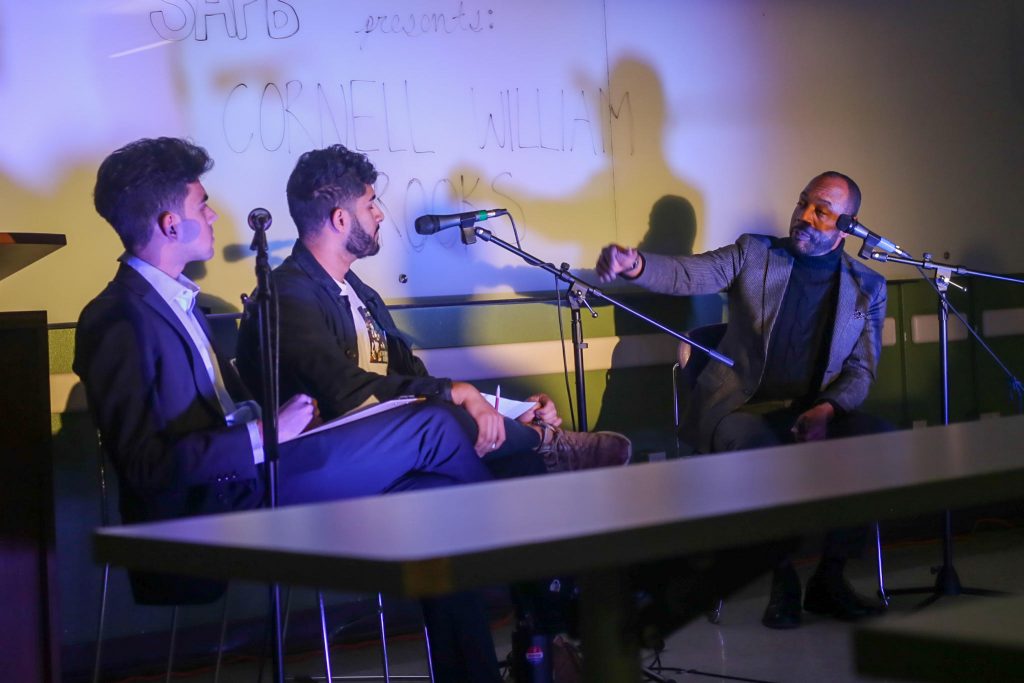Students came together this past Tuesday to discuss politics and activism with the former president of the National Association for the Advancement of Colored People (NAACP).
The Student Association Programming Board (SAPB) Insights Committee, in collaboration with the Phi Alpha Delta Fraternity, hosted Cornell William Brooks. The event was meant to create a space for students to discuss social movements as well as expectations and advice on how to lead a protest. Josh Samuel — president of Phi Alpha Delta Fraternity and the New York Public Interest Research Group (NYPIRG), vice president for the Roosevelt Network and a senior majoring in philosophy, politics and law — as well as Anindya Debnath, vice president for student success (VPSS) and a sophomore double-majoring in political science and economics, moderated the discussion, asking Brooks about his experience in politics and protest.
Brooks currently teaches at the Harvard Kennedy School of Government, and is a visiting professor at Harvard Divinity School. He is also a fourth-generation ordained minister, a civil rights attorney, a coalition builder and a “distinguished” activist for social justice. Brooks served at the 18th president and CEO of the NAACP.
The discussion began with Brooks evaluating the “ignorance” he believes individuals may have when it comes to their passions. Brooks encouraged Binghamton University students to not feel discouraged by his statement, but rather to allow it to motivate them to never stop being a student. To be able to follow in the footsteps of role models, Brooks said, it is necessary for students to read books written by people that inspire change.
“Older people can’t say young people should do it,” Brooks said. “Younger people can’t say older people should do it. Everybody has to assume the responsibility for making the change you can in your town, and you’re qualified right now.”
Brooks also shared advice on when to protest and effective ways to protest. Even if someone wants multiple aspects in a specific area to be reformed, Brooks explained, it is important to focus on one issue at a time to create the most change. Brooks followed by reviewing the “important questions” protesters should ask themselves, relating this to his efforts to remove power from former President Donald Trump’s administration.
Katie Dullaghan, insights chair for SAPB and a junior majoring in integrative neuroscience, helped coordinate the event. Dullaghan said Brooks was chosen as a speaker to provide advice to students interested in legal careers.
“We like to bring a wide range of speakers that appeal to different groups of students, and we believe Brooks will especially appeal to those interested in law and politics,” Dullaghan wrote in an email. “The overall meaning of this event is to enrich the lives of BU’s students by learning from someone who has accomplished and experienced so much.”
The event concluded with Brooks giving students guidance on how to interact with people who do not hold the same views. He encouraged students to be gentle and patient with people who may come from different backgrounds and cultures, emphasizing the importance of allowing people to engage in politics in different ways.
Mary Curtin, the marketing director of the SAPB Insights Committee and a senior double-majoring in business administration and graphic design, attended the event. Curtin expressed the importance she sees in fostering such conversations.
“I think it’s great to come to this kind of event and gain a different perspective on someone who is so distinguished and knows the industry so well,” Curtin said. “It’s great to hear someone who can give us advice that can help us find ways to create a positive impact in society.”



